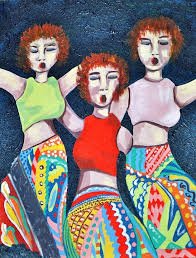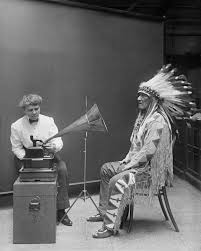
Lies, Love, & Magic: How Voice was Hijacked by Editor Mysticism & Workshop Critique BS!
The sought after and mysterious "voice" of writing. You watch editors salivate like Derridean defeatists about how magical voice can be when it "makes your foot tap to the rhythm." Aww, how romantic. We are lovely romantic beings who need magic in our lives. Well, I'm about to take the magic out of the what, where, and how to find a literary voice. For writers, we don't give a shit about magic. Our job is to deconstruct the process and lay it all out for other writers. We are here to help each other learn the tricks to make the magic happen for readers, which is why editors love to talk about the mysterious quality of writing. Because ultimately they are fans of literature. They are readers. We reader/writers--the ones who create the magic--must abandon all notions of romanticism. We're here to work. Why? Because we love the secrets of writing as much as we love the process. Because we love to make the magic and watch the readers read in awe.So if you've hit the google machine with a "how to find your voice" or "what is voice in literature" or "what is a writer's voice" then you've come to the right spot. I'm about to break this bad boy down.First and foremost I need to tell you what voice is not. So when we go to write we need the reader to see what we see as writers. The reader needs to be able to visualize the scenes as they play out in the course of our short story or novel. That is the action. That is description. The nuts and bolts.
For writers, we don't give a shit about magic. Our job is to deconstruct the process and lay it all out for other writers. We are here to help each other learn the tricks to make the magic happen for readers, which is why editors love to talk about the mysterious quality of writing. Because ultimately they are fans of literature. They are readers. We reader/writers--the ones who create the magic--must abandon all notions of romanticism. We're here to work. Why? Because we love the secrets of writing as much as we love the process. Because we love to make the magic and watch the readers read in awe.So if you've hit the google machine with a "how to find your voice" or "what is voice in literature" or "what is a writer's voice" then you've come to the right spot. I'm about to break this bad boy down.First and foremost I need to tell you what voice is not. So when we go to write we need the reader to see what we see as writers. The reader needs to be able to visualize the scenes as they play out in the course of our short story or novel. That is the action. That is description. The nuts and bolts. For example, if I write, "Dean took a step forward and gazed at the interesting ropes above." That is me describing action. This is the story. I'm going to say that again and put it in bold letters for emphasize. Okay, here goes: Action is the story. This is not the voice. The story is the most important part of writing. Not voice. I'll dispel voice in this post and then you can get to the real work: writing the story. It is the first and last thing you need to be thinking about when writing your short story or novel. You need to be focused on scene selection. Select your scenes in the sequence in which lays out the action to conclude on the climax. Scenes are the walls and floors of the house. Action and description are the nails and mortar holding the walls and floors together.Now it's time to decorate the house. Now "voice." Ready to dilute your desperate need for magic. Ready to grow up as a writer. Here goes. Voice is simply the insight, wisdom, and judgements of the narrator.So now I can hear people yelling at the computer screen. You need to take a breath. Life is not that hard. Take a minute and let me elaborate. I'll prove myself right. Oh, no wait, I'll allow you your "voice" and let you be the judge of that.
For example, if I write, "Dean took a step forward and gazed at the interesting ropes above." That is me describing action. This is the story. I'm going to say that again and put it in bold letters for emphasize. Okay, here goes: Action is the story. This is not the voice. The story is the most important part of writing. Not voice. I'll dispel voice in this post and then you can get to the real work: writing the story. It is the first and last thing you need to be thinking about when writing your short story or novel. You need to be focused on scene selection. Select your scenes in the sequence in which lays out the action to conclude on the climax. Scenes are the walls and floors of the house. Action and description are the nails and mortar holding the walls and floors together.Now it's time to decorate the house. Now "voice." Ready to dilute your desperate need for magic. Ready to grow up as a writer. Here goes. Voice is simply the insight, wisdom, and judgements of the narrator.So now I can hear people yelling at the computer screen. You need to take a breath. Life is not that hard. Take a minute and let me elaborate. I'll prove myself right. Oh, no wait, I'll allow you your "voice" and let you be the judge of that. So let's take the previously used example and rearrange it. Go back up and read if necessary. It was straight forward description. Now if I insert voice it might sound like, "Dean impulsively stepped forward (might know)--did his best to understand the intersecting ropes above." So with the quick insertion of an adjective "impulsively" and a quick but subtle judgement "did his best" I've cast judgement on Dean's actions. And the addition of (might know) is a Kiowa cultural judgment, so the "voice" is Kiowa and it is being judgemental of Dean's action.You can follow up the sentence with a bit of judgemental wisdom and add, "Still a monsape tali for his age (mid twenties) and you know how they say tali brains don't develop as fast a mautaun." So I've inserted a lot of Kiowa language into that one sentence but you can quickly assess by context the "voice" is making a judgement on the main character. By deduction and pop culture, you participate in the reading and deduce tali means boy and mautaun means girl. Why? Because it's commonly understood male brains develop slower than female brains.All I did was use judgement, insight, and wisdom. That's it. Nothing else. I did a little sentence play, and did my hyperlocal thing (indicative of my writing style). But I argue this: those pauses don't come until first you cast judgement, insight, and wisdom. I believe this to my core. So much so, I challenge you to take a straight forward sentence in your own story, add judgement (good or bad, love or hate doesn't matter), and all of a sudden you'll start putting in pauses and/or running sentences long. It is the judgement, insight, and wisdom that shapes the sentence. Hear me say that again: It is the judgement, insight, and wisdom that shapes the sentence.The Kiowa and hyperlocal tone all comes from judgement, insight, and wisdom. All our families and communities have it regardless of culture. In fact, as my mind starts to process the three aspects I mentioned, the tone of the community comes out. It is taking our mind space and inserting the value judgements which are already imbedded in us and using it as a tool to rearrange sentences. That's how you get those amazing sentences the great writers write, and that's how they developed their "voice."My favorite writers are N. Scott Momaday, Louise Erdrich, Gabriel Garcia Marquez, Alice Munro, and Junot Diaz. Take your pick. Go read their work, and then come back to me and tell me I'm wrong. In fact, I dare anyone to try to argue differently.
So let's take the previously used example and rearrange it. Go back up and read if necessary. It was straight forward description. Now if I insert voice it might sound like, "Dean impulsively stepped forward (might know)--did his best to understand the intersecting ropes above." So with the quick insertion of an adjective "impulsively" and a quick but subtle judgement "did his best" I've cast judgement on Dean's actions. And the addition of (might know) is a Kiowa cultural judgment, so the "voice" is Kiowa and it is being judgemental of Dean's action.You can follow up the sentence with a bit of judgemental wisdom and add, "Still a monsape tali for his age (mid twenties) and you know how they say tali brains don't develop as fast a mautaun." So I've inserted a lot of Kiowa language into that one sentence but you can quickly assess by context the "voice" is making a judgement on the main character. By deduction and pop culture, you participate in the reading and deduce tali means boy and mautaun means girl. Why? Because it's commonly understood male brains develop slower than female brains.All I did was use judgement, insight, and wisdom. That's it. Nothing else. I did a little sentence play, and did my hyperlocal thing (indicative of my writing style). But I argue this: those pauses don't come until first you cast judgement, insight, and wisdom. I believe this to my core. So much so, I challenge you to take a straight forward sentence in your own story, add judgement (good or bad, love or hate doesn't matter), and all of a sudden you'll start putting in pauses and/or running sentences long. It is the judgement, insight, and wisdom that shapes the sentence. Hear me say that again: It is the judgement, insight, and wisdom that shapes the sentence.The Kiowa and hyperlocal tone all comes from judgement, insight, and wisdom. All our families and communities have it regardless of culture. In fact, as my mind starts to process the three aspects I mentioned, the tone of the community comes out. It is taking our mind space and inserting the value judgements which are already imbedded in us and using it as a tool to rearrange sentences. That's how you get those amazing sentences the great writers write, and that's how they developed their "voice."My favorite writers are N. Scott Momaday, Louise Erdrich, Gabriel Garcia Marquez, Alice Munro, and Junot Diaz. Take your pick. Go read their work, and then come back to me and tell me I'm wrong. In fact, I dare anyone to try to argue differently.
Support a Native owned Etsy shop, Allies United, where I offer unique merch for allies of social justice movements, like MMIW, Native Lives Matter and Black Lives Matter. Take a look inside my Etsy shop here: etsy.com/shop/AlliesUnited.
(Images used in this post are not the property of the author. They were borrowed from Wikipedia, PxHere, and Pixabay)